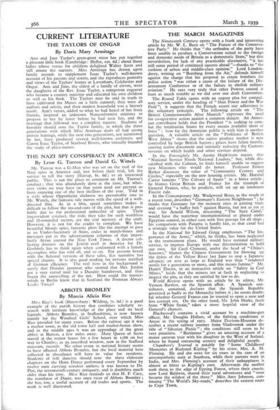THE MARCH MAGAZINES
The Nineteenth Century opens with a frank and interesting article by Mr. W. L. Burn on " The Future of the Conserva-
tive Party." He thinks that " the orthodox of the party have been unable to produce a Conservatism suited to the foreign and domestic needs of Britain as a democratic State," but that nevertheless, for lack of any practicable alternative, " it has still some period of continued success ahead "—thanks to " the cushion of urban and middle-class opinion." Lord London- derry, writing on " Bombing from the Air," defends himself against the charge that his proposal to retain bombers for police action " was either a cause of the failure of the Dis- armament Conference or of the failure to abolish military
aviation." He says very truly that other Powers caused at least as much trouble as we did over our draft Convention. The Round Table opens with an urgent plea for compul- sory service, under the heading of " Man Power and the War
Peril "; it suggests that the French resent our adherence to the voluntary principle. The following article on " The British Commonwealth After Munich " expresses the need for co-operative action against a common danger. An Ameri- can contributor holds that the President " is seeking to com- bat the totalitarian States by every means available short of force " ; how far the American public is with him is another question. A valuable article on the " Problems of British West Africa " shows that the native produce market is now controlled by large British buyers ; prices have fallen heavily, causing native discontent and seriously reducing the Customs revenue on which health and other services depend.
In the Fortnightly Mr. Austin Hopkinson argues that " National Service Needs National Leaders," but, while dis-
satisfied with the Cabinet, he finds himself unable to suggest new Ministers who would do better. Professor Ernest Barker discusses the value of " Community Centres and Circles," especially on the new housing estates. Mr. Horsfall Carter laments " The Calvary of Spain " in a bitter article ; he blames Great Britain and France for the triumph of General Franco, who, he predicts, will set up an intolerant Fascist rule.
In the Contemporary Mr. Wedgwood Benn, as the result of a recent tour, describes " Germany's Eastern Neighbours " ; he
thinks that Germany for the moment aims at gaining trade and creating " a buffer belt " against Russia, but not as yet at war. Sir Arnold Wilson, discussing " The Suez Canal,'' would have the waterway internationalised or placed under Egyptian control, in either case with free passage for all ships ; his comparison with Panama is hardly fair, as that canal had a strategic value for the United States.
In the National Sir Edward Grigg emphasises " The Im- portance of the Army," which, he thinks, has been neglected
in the rearmament plans. He would have national military service, to impress Europe with our determination to hold our own. Sir Cecil Clementi, under the head of " China's Sorrows," blames the Chinese Government for blowing up the dykes of the Yellow River last June to stop a Japanese advance; an area as large as England was thus " rendered sterile for a generation or more, and this means famine." Mr. Daniel Davies, in an instructive article on " Safety in Coal Mines," holds that the miners are at fault in neglecting to inspect the pits, as they are entitled by law to do.
World Review opens with an article by its editor, Mr. Vernon Bartlett, on the Spanish affair. A Spanish con-
tributor, unnamed, declares that the Spanish Republic governed as badly as the Monarchy before it ; he seems doubt- ful whether General Franco can be trusted to open a new and less corrupt era. On the other hand, Mr. John Marks, fresh from " White Spain," takes a more hopeful view of the General's chances.
Blackwood's contains a vivid account by a machine-gun officer, Mr. Douglas Hallam, of the fighting conditions at Anzac in the spring of 1915. Major Davison-Houston de- scribes a recent railway journey from Vladivostok under the title of " Siberian Picnic " ; the conditions still seem to be very primitive. " Bartimeus " gives an amusing account of a motor caravan tour with his daughter in the West of Ireland. where he found entrancing scenery and delightful people.
Chambers's journal is notable for " Some Childhood Memories of Rudyard Kipling " by his sister, Mrs. A. M. Fleming. He and she were for six years in the care of an unsympathetic aunt at Southsea, while their parents were in India, and Mrs. Fleming's account of their unhappiness is almost as bitter as Kipling's own. Afterwards the mother took them, to the edge of Epping Forest, where their cousin, now Lord Baldwin, shared their rural adventures and " soon became the wildest of the three." Miss Amy Johnson, con- tinuing " The World's Sky-roads," describes the eastern route to Cape Town.


























































 Previous page
Previous page